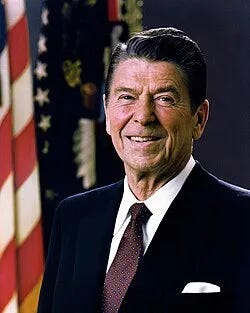The eight decades following the Second World War created the richest and most broadly prosperous societies in human history. That long post‑war boom has been dying for a long time. Yesterday spelt the end.
Donald Trump’s abrupt decision to leave the recent G7 summit early—ostensibly to address the escalating conflict between Iran and Israel—captures the moment’s instability. Israel, historically assertive and intent on regional dominance, launched what it claims was a pre‑emptive strike on Iran. Trump’s motives remain opaque, yet his premature departure signals more than impatience: it highlights a fracturing Western alliance and the probable end of a political epoch. Trump said publicly (so far) that it was a good meeting and he’s happy with the outcome, but the leader of America leaving to go start another middle eastern conflict (if pizza purchases are any indication) is about as clear a sign as any that this era is over.
For roughly forty years the West sat alone at the pinnacle of global power. Today that advantage is contested by India, China, Russia, and their BRICS partners. As autocratic states grow, Western supremacy can no longer be taken for granted. In the early 2000s China fielded a formidable military but was still treated as a secondary cultural and economic actor. Now it stands as a peer—and Western complacency is perilous.
To understand the present crisis we have to revisit the origins of the modern welfare state. The immediate post‑war era—often called the “golden age” of capitalism—was shaped by Franklin D. Roosevelt’s pro‑worker reforms. High marginal tax rates on corporations (often 70–90 percent) funded expansive welfare programs across the West. For a time, ordinary people shared equitably in rising productivity.
The “Greatest Generation,” having endured two global wars and the horrors of the Holocaust, resolved that humanity could not survive a third cataclysm. They demanded—and largely won—structural changes that channelled national wealth toward the common good. The leaders of the western world who came out of that era were often great men who believed in something, people with political will who would never have been able to imagine the system degrading to where it has today. Even Nixon, in his controversies, created the environmental protection agency, expanded welfare and started food stamp systems.
He was considered a very conservative republican.
That golden age ended in the 1970s with stagflation. As World History Journal explains, oil shocks, shifting monetary regimes, and escalating geopolitical tensions produced simultaneous inflation and stagnation—an economic malaise eerily familiar today. A CNN retrospective likewise portrays the decade as one of near‑constant turbulence, a mood captured in the music of the Rolling Stones, The Who, and the nascent punk scene.
From that turmoil emerged a new project: neoliberalism. This word has become the modern boogeyman of the left, but stripped of polemics, neoliberalism was an attempt to jolt economies back to life through tax cuts, deregulation, and privatisation. Its champions were Ronald Reagan in the United States, Margaret Thatcher in the United Kingdom, and Brian Mulroney in Canada (who followed Pierre Trudeau’s economic nationalism). In Canada, state assets—from vaccine production to energy—were sold off; corporate taxes fell.
Markets were set free.
The model delivered short‑term growth but at a cost. Governments became junior partners to big business, professing solidarity with workers while hollowing out the middle class. Social services were pared back; once‑proud institutions like Canada’s public health‑care system began to weaken. Six‑hour emergency‑room waits in the 2000s have stretched to twelve today.
Most citizens remained comfortable enough not to rebel—until now. Trump rode that simmering discontent to power, and his brand of right‑wing populism now haunts Australia, Canada, and much of Europe. His response to the protests in LA, broadly peaceful, were an overreach of a dying democracy. Most observers have started saying that democracy is unlikely to last in the USA, and articles abound on how this is the result of complacency from liberal thinkers. It is easy to see how the moderate, centrist moves of democrats and liberals have caused the rise in populism. Extremism is the only possible result of inequality.
In Canada, voters turned to Mark Carney partly as an antidote to Trumpist attitudes and the obvious similarities of Poilievre. Yet Carney personifies the very order that produced Trump. His instinct is to press on with business as usual, even as the middle class erodes. That inertia could pave the way for angrier figures—perhaps further to the right of Pierre Poilievre, angrier men with no regard for Canada’s social structure or poor—to seize the Conservative leadership.
We are hearing the death knell of a system that briefly worked and then exhausted itself. What follows may be better or far worse. Will Canada’s next leaders show genuine resolve, or cling to a failing status quo?
We inhabit a new 1970s—an age of stagflation and social unrest. The eventual response is bound to be radical; the only question is whether it will uplift those at the bottom or drag us deeper into Trump‑style politics.




